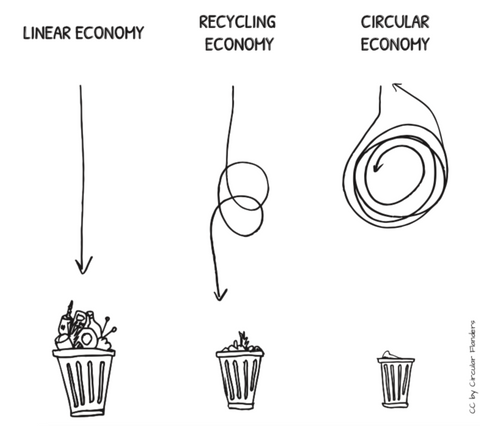What Makes éclipse Glove Sustainable?

As an apparel company, we are aware of the waste that clothing manufacturing creates and we are sensitive to our place and role in the planet’s ecosystem. Earth is our biggest priority, so we focus on thoughtful consumption and sustainable business practices.
It all begins with the design of our clothing. We help our customers pare down the clothing they wear through our designs as well as resources such as the Slow Fashion Guide. By making clothing that is both physically and emotionally durable, we limit the amount of clothing being retired or thrown away. By making the pieces versatile we limit the amount of clothing being purchased in the first place.
Next, we focus on manufacturing. We use fabric that uses less water and energy than regular polyester and gives single-use plastic a new life. All of our pieces are sewn locally and manufactured ethically. Review our Supplier Code of Conduct to understand our manufacturing standards. Furthermore, we work with a Bluesign system partner to ensure we meet the highest safety in chemicals standards and maintain the safety and health of our manufacturers.
“As a creator of clothing, I take my impact on the planet’s health to heart. At éclipse Apparel we’ve chosen to transition our fabric to recycled polyester made from bottles. This fits with my vision to create a truly sustainable and environmentally friendly clothing company.”
~ Élise Champe, Founder of éclipse Apparel

The Circular Fashion Model
At éclipse, we are moving towards a Circular Fashion model ~ we are changing our approach from the linear “take-make-waste” model the fashion industry has used for decades.
The old fashion industry model :
- Take: new raw materials and resources
- Make: new fabric, new clothes
- Waste: dump what we don’t consider pertinent: any parts of the fabric that aren’t needed for production, along with our apparel being added to overflowing landfills when not used anymore.
Because of this model, the fashion industry is implicated in creating significant pollution. We can do so much better.
éclipse has signed the Circular Fashion Pledge to reduce waste generation significantly, per the United Nations Sustainable Development Goal 12.5, by implementing all three goals of:
- Taking back our used garments
- Increasing our recycled content
- Designing for physical and emotional durability
Circular Fashion is a system where a garment’s production and end of life are considered so as to minimize the impact on the climate and earth. Materials used, production practices, and utility and durability of fabric and garments are all considered. This is within the context of a circular economy which is based on eliminating waste pollution and keeping products & materials in use.

Why recycled Polyester (rPET)?
rPET has been designated a Preferred Material by the Preferred Fibers and Market Report. The Textile Exchange and the UN’s Fashion Industry Charter for Climate Action are joining together to challenge the fashion industry to bring the percentage of rPET up from 14% to 45%, with the goal of reaching an absolute 90% recycled volume share by 2030.
As a clothing manufacturer that uses polyester fabric, we believe it is our responsibility to implement this change for the benefit of our planet. This helps divert plastic bottles from landfills and waterways. We estimate 15 20 oz. soda bottles equals one of our éclipse Hoodies in large.
Plastic bottles saved from landfills and waterways can be used to create clothes! And when you no longer need or wear it, any éclipse item can then be returned back to us - we'll recycle or repurpose it to keep it from entering the landfill.
We selected a Bluesign system partner to ensure we meet the highest safety in chemicals standards. Bluesign is a chemical compliance standard that tests for assurance at the forefront to insure safety in chemicals throughout the dyeing and finishing process. As well, they have strict standards in regards to affluent and emissions plus chemical management.
Our Recycled Polyester (rPET) is:
87% recycled poly, 13% spandex
- soft
- stretchy
- lightweight
- wrinkle-resistant
- UPF50
- and drapes beautifully
Its production requires far fewer resources than new fibers. Since our new polyester fabric is recycled, crude oil and natural gas extractions are completely avoided, saving on emissions.
What you can do as a consumer:
Know your brands and their ethos. Ask questions; if they walk the talk, they’ll be more than happy to share their sustainable practices.
Buy less, buy better - look for items that are versatile, are made to last and whose production is as gentle as possible on the earth.
Thrift more - consumerism and the constant need for the newest and greatest is evident in landfills, but also in thrift and consignment stores. There are absolute TREASURES to be found in second-hand stores, and at a small fraction of the cost of buying a new item. Switching our mindset from buying brand new to buying ‘new to you’ will benefit both you and our planet in the long run.
Implement the 4R’s - Reduce (declutter), Reuse (use longer, repurpose or swap), Repair (to add to the product’s longevity), Recycle (sell, consign, donate, send back to the company if they accept their used garments).
The fashion industry has treated the earth’s resources and people carelessly, and there are consequences to that. The goal needs to be to keep our environment as healthy as possible so that we can enjoy it.
As the owner of an apparel company, I’m constantly looking for ways to make positive impacts, so I’m truly excited for this big change in our company. At éclipse, we aim to be a catalyst in a paradigm shift. Along with educating people on the benefits of rPET, I’m designing clothing for longevity, and encouraging people to use their garments longer and keep them out of landfills. I love to share planet-friendly ideas for people’s everyday lives, because each of us make an impact.
But we don't stop there! Shipping out our clothing also has an environmental effect. The is why we offset our customer's shipping carbon footprint by planting a tree with each order. Even the smallest details need to be taken care of; we are currently transitioning to compostable/recyclable packing and shipping materials.
Even after eclipse clothing leaves our shop, it doesn't stop being our responsibility. That's why éclipse has a take-back program, where we take back garments to keep clothing out of landfills. Additionally, we save our fabric scraps for recycling back into textiles. Only 1% of clothing is made back into textiles so we are proud to be part of this circular approach to fashion.
Meet our éclipse Advisory Board; a band of experts who help make éclipse better. It takes a village!

Bonnie Ballantyne I'm a farmer's daughter who went to Harvard, studied Human Development, married, had two children, went to work as a statistician, advertising executive, researcher and Market Analyst. Divorced, finished Masters in HD at U of Il, remarried, added 2 step-children ran a design firm with husband, Kelso. Big Bank red-lining killed our business in Springfield, Il and I went back to corporate ad biz in LA (Marketing and Research Director Y&R West / Dancer Fitzgerald Sample). My employers got bought by foreign competitors (Dentsu/Saatchi Saatchi). Tried teaching at USC but, at $2,300 a semester, couldn't afford the job. Moved to TX so Kelso could work for his dad, building banks. 1984, no jobs in TX so commuted to St. Louis, working on projects for MARC. Had it with TX, headed for CO. 1986, no jobs in CO. Ran Evergreen PRSA stables, cooked at the Mark Singer, River Sage and Observatory. Did consulting for local banks until I went to work for US West as as Advertising Research Director, then to Russia/Eastern Europe as Business Development Strategist. Left in 1993. Went to mountains to heal my corporate wounds. Ended up building geodesic domes. In 2000, siren voice of the corporate world (cha-ching) called and I marched into high tech at McDATA as Market Analyst and Business Development Strategist. Retired from the corporate world in 2004.
After my son, Adam Stetson, died in 2011, I wrote Crocodile Goes Out, a children's book in 3 languages: English, Spanish and Maya, published by Amazon. In May of 2015, Kelso and I were living in Playa del Carmen, MX, when I had an opportunity to return to my roots, the farm. This time the farm was called la Quinta, and it was in Portugal. When our 90 day EU visas expired, we returned to Playa del Carmen.
In 2016, we moved back to the Prospect neighborhood of Longmont, CO, where we have lived intermittently since 2000. After retirement from McDATA, I continue to consult with organizations, friends and family on various business ventures. I look forward to more opportunities to share ideas and experience with others in the future.

Nichole Jones is an Ayurvedically inspired Life Coach specializing in Women's Emotional Well-being. I use yoga, mindfulness, Brainspotting, energy work, and a client-centered approach to help clients achieve optimal functioning.

Patrick Stratton is an experienced CEO with a demonstrated history of working in the sports industry. Strong business development professional skilled in management, sustainability, team building, product design, development and sourcing.
